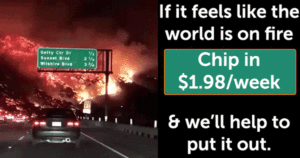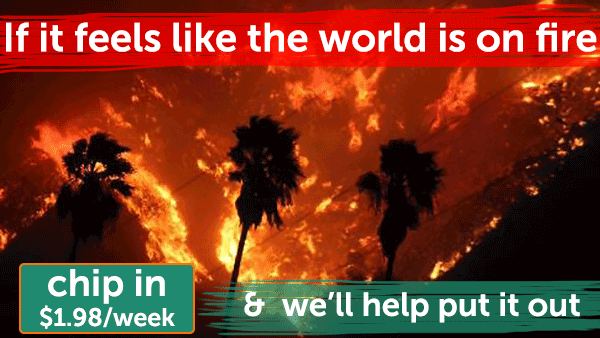Last week I told you about why I think it’s important to start 198 methods as another non-profit, environmental advocacy group (Missed it? Click here for the refresher, 5 charts and 2 maps). This week, I’m all about how we win.
I lay out some specific examples, strategies, and ideas below. But the TL;DR is this: It costs about $100 a week to keep all this going, and we want to scale UP the project in 2018. So I’m looking for about 50 people to donate $1.98 a week for the next 6 months. Can you help?
The context is that we have a very limited amount of time to make some dramatic changes in our politics, culture, and economy. As Bill McKibben just said in (another) great Rolling Stone piece based on one of the same graphs I used in last week’s post — Winning slowly is the same as losing.
 So, how do we win? My plan has three prongs, just like most outlets in your house. And that’s a metaphor for how I think this can work, too. In your electrical socket, the three prongs work like this: the top two vertical slots carry electricity – one is “neutral” and one is “live”, which is to say one side pushes electricity in to your computer, toaster or whatever, and the other side completes the circuit like an out flow (Don’t panic engineers, I know this is not exactly how electricity works. It’s a metaphor, right?). The bottom, usually round, part is the ‘grounding’ wire.
So, how do we win? My plan has three prongs, just like most outlets in your house. And that’s a metaphor for how I think this can work, too. In your electrical socket, the three prongs work like this: the top two vertical slots carry electricity – one is “neutral” and one is “live”, which is to say one side pushes electricity in to your computer, toaster or whatever, and the other side completes the circuit like an out flow (Don’t panic engineers, I know this is not exactly how electricity works. It’s a metaphor, right?). The bottom, usually round, part is the ‘grounding’ wire.
The live push
What we’ve been doing isn’t working (fast enough). It’s great that the price of renewable energy has fallen dramatically. But so has the price of fracked gas. And in most places, it’s gas and not renewables that are replacing coal. It’s great that lots of auto companies are moving to electric cars, but too many of us can’t afford even the “affordable” Tesla. Society is at a tipping point, but it needs a big push if we’re going to escape the status quo (which basically leads to catastrophic climate change). Here’s how we help tip things over the edge:
Delay new fossil fuel projects by getting right in front of them and saying stop. This is an across the board ‘throw sand in the gears’ strategy. We gum up the regulators that review and approve these project – like we’ve been doing for years at FERC with our friends at Beyond Extreme Energy – and expand that to state regulators too. Our friend Nancy LePlaca calls this the “occupy the PUCs” (Public Utility Commissions) strategy – and it could world. But it needs a sustained presence in multiple states to make it work. This is also where the Promise to Protect, which some 1800 of you have signed on to already, comes in. That promise, specific to the massive Keystone XL pipeline may of us have been fighting for more than a decade, is to show up in love and discipline only when called and at the direction of the ‘moccasins on the ground’. Most of that phrasing is borrowed from the amazing Judith LeBlanc of the Native Organizers Alliance, who spoke on last night’s webinar. And that’s exactly what we need. But it will take training, organizing, and a whole-lotta-logistics to make it happen.
Name, shame and frame the powerful people behind this disaster. We’re not all equally responsible for the climate crisis. And we’re not all equally impacted by it either. Women, indigenous communities, and people of color are hit first and worst by the impacts, and are afforded the least power to make big changes we need. On top of that, most people who talk about climate change aren’t actually willing to do the things that are required. Two small examples from this week’s headlines: None of the Republicans on the “climate solutions caucus” in Congress has committed to voting against the tax bill that opens ANWR to drilling (and which is terrible in a million ways, and at least a dozen of those ways are terrible for the climate too). And the newly elected Democratic Governor of Virginia, Ralph Northam, says he cares about climate change, but also supports 2 new fracked gas pipelines proposed for his state. Fortunately, this is a place where digital communications and networking can make a big difference. We can create ads, memes and messages that make it clear who’s responsible for this crisis (#ExxonKnew), and use these tools to support confronting our opponents and so-called friends alike. You saw an exmaple when we sat in outside Chuck Schumer’s office last summer to demand he lead Senate Dems in real climate action, instead of just letting Al Franken and other ‘so called’ leaders make videos about it. There are some great opportunities to do a lot more of this in the next few months with the Tax bill in Congress, the inauguration of two new Democratic governors in Virginia and New Jersey, and of course the ongoing disaster of the Trump Presidency.
The neutral pull
Naomi Klein likes to say that “no is not enough” and she’s right. If we’re just against everything – both major political parties, most of the ways we power our homes and businesses, beachfront housing – then we’re not making progress. We need to build the kinds of intentional, sustainable, democratic communities we want – starting with our own protest camps and organizations. Only when people see that it’s not only safe, but desirable to live in a world without climate change will we create the kind of mass movement we really need.
Divest and invest – Divestment sounds like a “no”, but the money we STOP spending on fossil fuels usually goes somewhere else (and better). For the last few months one of our major campaigns has been focussed on getting big international banks to stop funding specific projects like the Dakota Access and Keystone XL pipelines that threaten both our climate and the human rights and sovereignty of indigenous people. We want to continue that work in 2018, of course, in collaboration with Mazaska Talks and other partners. But we also have a great opportunity to start using our collective assets to fund real solutions. I was on a webinar yesterday about how to get the information and action to move dozens of cities and states to put our money (that’s your local property tax dollars, sales taxes and more) into municipal banks and other local, clean solutions instead of relying on the worst of the Wall Street banks – like Wells Fargo, Citigroup, JP Morgan Chase, and the rest. But we need sustained support to take the fight to dozens of cities and begin really owning what we own.
Build what you want in the shadow of the beast. One of the reasons we all love the spiritual encampments that have sprung up all over North America is that they build the world we want in the path of things we oppose. Most of these encampments are solar powered, sustainably built using local materials, and (often) indigenous wisdom and knowledge of the land. They also have cool gadgets, like wifi and drone-mounted cameras, so that they can show you what the place they’re defending looks like and how they’re doing it. We need to support all these camps in 2018, but we also want to focus on building and supporting projects that really represent the world we want – just, sustainable, and empowered. Just an example to get your wheels turning: our friends at the L’eau Est Le Vie camp in Louisiana just closed on a piece of land in the path of the pipeline. On that land they envision a solar-powered community center with indigenous cultural learning and ceremony space, a co-op community garden, a natural outdoor classroom for children, art and training space, natural disaster preparedness, local elder share opportunities, and much more. Awesome, right? Please chip in to help them do that. But also, we need one of those in the path of every pipeline. And we need the training, materials, skills, and savvy in dozens of communities to know how to build those spaces and communities.
 Grounding
Grounding
Most of the specific projects I have in mind are listed above. But the third and essential part of this plan is to be present, real, and willing to show up for friends and allies (in and out of the climate movement) when they need us.
For the last few months, a lot of that has been in the form of disaster response. This community raised thousands of dollars for “direct relief” in the wake of Hurricanes Harvey and Irma. Direct relief meaning we didn’t give the money to the Red Cross (who has a pretty lousy track record responding to these kind of emergencies) and we didn’t keep a percentage of the proceeds. Watching the footage of the fires in California this week (and the ongoing recovery in Puerto Rico, and…, and …, and….) it’s clear we’re going to need to do a lot more of that.
But we also need to do more than respond to disasters. We need to show up in solidarity, teach people how to raise money at the speed of the internet, and build deep collaborations like the kind that came together at last month’s People Vs. Oil & Gas summit. One of our first projects: Continuing to support the digital work-spaces from that conference by getting all the trainings and presentations online where the community (including those who couldn’t make it to Pittsburgh). AND building out a new set of trainings and skill-shares online so we can expand the circle of learning even more.
And I want to be able to help fund your projects (yes you) too! Hundreds of folks wrote back or responded to our survey to tell us about things they’re doing – from building solar-powered, carbon-zero homes to replace the ones destroyed in the California fires; to producing new documentaries on fracking for gas and its impact on human health and the climate. Because the simple truth is I don’t have al the answers or know all the best ways to fight climate change. And neither do you. The best thing we can do is try and stay in touch, and connect each other to all the amazing work going on already. And one way we can help is just by chipping in to support it.
So, what do you say – Can you chip in $1.98 a week so we can do ALL that great stuff?
